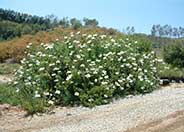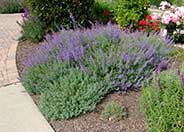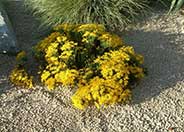
Common name:Yellow bulbine
Botanical name:Bulbine frutescens 'Yellow'
This clumping groundcover grows 1' tall and 1'-3' wide. It produces 12"-18" flower stalks that bear clusters of small yellow flowers almost all year. Succulent evergreen leaves are fragile, so locate away from foot traffic. Growth habit is not very tidy whereas the orange cultivar 'Hallmark' is a bit more so. This So. African native blooms most heavily in spring and fall with sporadic spikes in summer. It is also a good container plant and for erosion control.

Common name:Matilija Poppy
Botanical name:Romneya coulteri
Crowned by white poppies, this high-impact, spreading, gray green perennial stands statuesque at 5"-8" tall. It is best used where its scale and habit will not overpower, and it requires no summer water and thrives on dry alluvial slopes..

Common name:Purple Leaf Eastern Redbud
Botanical name:Cercis canadensis 'Forest Pansy'
This small tree may reach 25' tall and it has dark green/purple leaves that are purple in the fall. Amazing pink flowers bloom in the spring and fill the tree.

Common name:California Fuchsia, Zauschneria
Botanical name:Epilobium canum
The California fuchsia is a perennial with dense, narrow, green gray foliage and red orange summer flowers. The growth habit of this plant is sprawling and low. The California fuchsia is native to California, is drought tolerant, and attracts hummingbirds.

Common name:Catmint
Botanical name:Nepeta X faassenii
Nepeta faassenii makes soft, gray green, undulating mounds that are 1.5' high when blooming. The small leaves are attractive to cats. This perennial has lavender blue flowers in late spring and early summer.

Common name:Damianita
Botanical name:Chrysactinia mexicana
This mounding groundcover grows slowly to 2' x 2'. Golden yellow daisylike flowers appear in spring and fall. The yellow flowers agains the aromatic dark green foliage makes it a colorful accent. Good for courtyards. Resembles turpentine bush but has longer bloom period. Needs good drainage. Periodic pruning willinduce flowering. Accepts reflected sun. It is a slow grower so be patient. Native to western Texas and Mexico.

Common name:Damianita
Botanical name:Chrysactinia mexicana
This mounding groundcover grows slowly to 2' x 2'. Golden yellow daisylike flowers appear in spring and fall. The yellow flowers agains the aromatic dark green foliage makes it a colorful accent. Good for courtyards. Resembles turpentine bush but has longer bloom period. Needs good drainage. Periodic pruning willinduce flowering. Accepts reflected sun. It is a slow grower so be patient. Native to western Texas and Mexico.

Common name:Damianita
Botanical name:Chrysactinia mexicana
This mounding groundcover grows slowly to 2' x 2'. Golden yellow daisylike flowers appear in spring and fall. The yellow flowers agains the aromatic dark green foliage makes it a colorful accent. Good for courtyards. Resembles turpentine bush but has longer bloom period. Needs good drainage. Periodic pruning willinduce flowering. Accepts reflected sun. It is a slow grower so be patient. Native to western Texas and Mexico.

Common name:Smooth-edged Agave
Botanical name:Agave weberi
This is a striking medium-sized Agave that can grow to 5' tall by 6'-10' wide. This agave has very fine marginal teeth and is sometimes spineless. Supplemental summer watering can prevent yellowing from heat stress in the summer. These plants are also moderately cold hardy and tolerant of temperatures down to 12 degrees F. It is more refined looking than americana. It is native in central Eastern Mexico. It is one of the largest of the Agaves.

Common name:Sundrops
Botanical name:Calylophus hartwegii
This low-growing perennial grows 2' x 3' and has woody stems with bright green leaves. It produces large, lemon yellow flowers that are up to 4" across and bloom spring through summer.
Designer: Susan Triindle
Photographer: GardenSoft
Practice grass-cycling by leaving short grass clippings on lawns after mowing, so that nutrients and organic matter are returned to the soil.
Be sure to fix all leaks promptly no matter how small they may seem.
Attract, or buy beneficial insects such as ladybugs and lacewings to control pest outbreaks in your garden.